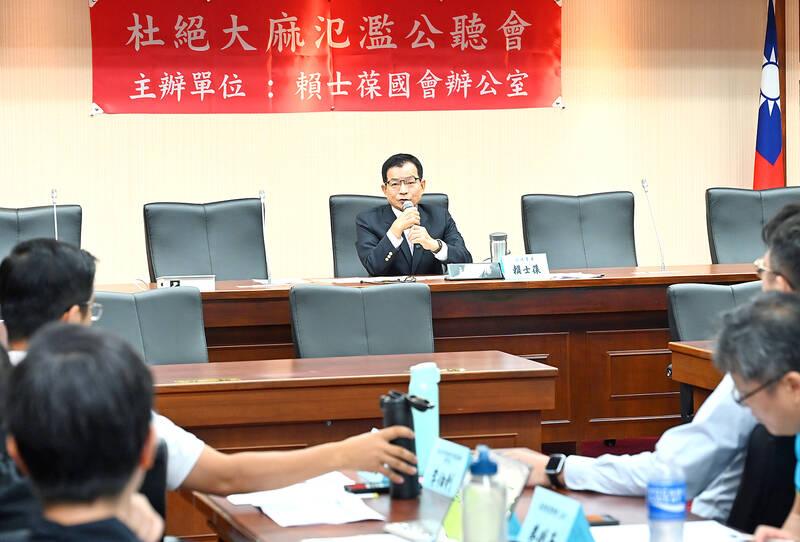Harsher punishments are needed to curb the “rising tide of cannabis flooding into the country,” Chinese Nationalist Party (KMT) Legislator Lai Shyh-bao (賴士葆) told a public hearing yesterday, while advocates said that Taiwan should follow the worldwide trend of legalization.
Lai’s legislative office, with support from church groups and family welfare organizations, held a public hearing at the legislature, where people expressed opposition to all forms of cannabis use, calling it “a gateway drug” and warning of its effects on young people.
Cannabis is a Category 2 narcotic according to the Narcotics Hazard Prevention Act (毒品危害防制條例), but “Taiwan is under assault from its increasing consumption and illegal sale,” Lai said.

Photo: Tien Yu-hua, Taipei Times
More people are using vapes or e-cigarettes, which often contain cannabis extracts, he said.
“Another front is the influx of online sales platforms, which are easily accessible by young people,” he said, adding that transactions are difficult to track down.
Many online forums and influencers are promoting the benefits of cannabis, yet no government agency is cracking down on Web sites that advocate its use, Lai said.
“These are worrying trends,” Christian pastor Chen Shang-jen (陳尚仁) said. “The Internet is full of ‘friendly talk’ on cannabis use, but they are giving incorrect medical information. We should demand corrections or remove them.”
Other speakers cited data showing a surge in cannabis use among young people and said their own surveys showed that more than 90 percent of Taiwanese are opposed to decriminalization of the drug.
However, Green Party member Zoe Lee (李菁琪) and others have called the surveys unreliable, saying that they mainly garner responses from churches and conservative groups.
Taiwan Weed Safety Education Association director Chung Ho-yun (鍾和耘) said that harsh repression of cannabis “has failed in the past and will certainly fail in the future.”
“The way forward is to go with the worldwide trend to decriminalize cannabis use, as the UN has done, as well as the US, Germany and many other democratic nations,” Chung said.
Opponents know that policies have been unjust in applying severe punishments for a low-risk substance that has many medical uses to treat terminal illnesses and relieve pain, he said. “These policies have ruined many innocent lives.”
Criminalization “has brought more harm than good to our society,” he said. “Today the worldwide trend is changing, and now Taiwan has the opportunity to take the right steps to open up.”
He accused Lai’s office of not allowing his organization to participate in the event.
“Public policies need input from all sectors of society, especially on contentious issues, but Lai only invited churches and conservative groups with views aligned with his own,” Chung said.
Lai said that the “rising tide” of cannabis use was due to inaction by the government.
He also condemned Constitutional Interpretation No. 790, which says that the punishment for growing cannabis contravened the principle of proportionality.
An amendment was subsequently passed to reduce the penalty to a minimum of one year in prison, down from five years.

Chinese Nationalist Party (KMT) Chairman Eric Chu (朱立倫), spokeswoman Yang Chih-yu (楊智伃) and Legislator Hsieh Lung-chieh (謝龍介) would be summoned by police for questioning for leading an illegal assembly on Thursday evening last week, Minister of the Interior Liu Shyh-fang (劉世芳) said today. The three KMT officials led an assembly outside the Taipei City Prosecutors’ Office, a restricted area where public assembly is not allowed, protesting the questioning of several KMT staff and searches of KMT headquarters and offices in a recall petition forgery case. Chu, Yang and Hsieh are all suspected of contravening the Assembly and Parade Act (集會遊行法) by holding

PRAISE: Japanese visitor Takashi Kubota said the Taiwanese temple architecture images showcased in the AI Art Gallery were the most impressive displays he saw Taiwan does not have an official pavilion at the World Expo in Osaka, Japan, because of its diplomatic predicament, but the government-backed Tech World pavilion is drawing interest with its unique recreations of works by Taiwanese artists. The pavilion features an artificial intelligence (AI)-based art gallery showcasing works of famous Taiwanese artists from the Japanese colonial period using innovative technologies. Among its main simulated displays are Eastern gouache paintings by Chen Chin (陳進), Lin Yu-shan (林玉山) and Kuo Hsueh-hu (郭雪湖), who were the three young Taiwanese painters selected for the East Asian Painting exhibition in 1927. Gouache is a water-based

Taiwan would welcome the return of Honduras as a diplomatic ally if its next president decides to make such a move, Minister of Foreign Affairs Lin Chia-lung (林佳龍) said yesterday. “Of course, we would welcome Honduras if they want to restore diplomatic ties with Taiwan after their elections,” Lin said at a meeting of the legislature’s Foreign Affairs and National Defense Committee, when asked to comment on statements made by two of the three Honduran presidential candidates during the presidential campaign in the Central American country. Taiwan is paying close attention to the region as a whole in the wake of a

OFF-TARGET: More than 30,000 participants were expected to take part in the Games next month, but only 6,550 foreign and 19,400 Taiwanese athletes have registered Taipei city councilors yesterday blasted the organizers of next month’s World Masters Games over sudden timetable and venue changes, which they said have caused thousands of participants to back out of the international sporting event, among other organizational issues. They also cited visa delays and political interference by China as reasons many foreign athletes are requesting refunds for the event, to be held from May 17 to 30. Jointly organized by the Taipei and New Taipei City governments, the games have been rocked by numerous controversies since preparations began in 2020. Taipei City Councilor Lin Yen-feng (林延鳳) said yesterday that new measures by